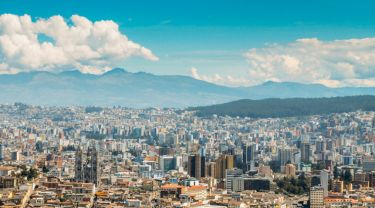On Feb. 4, 2025, Canada and Ecuador concluded negotiations for the Canada-Ecuador Free Trade Agreement (FTA). Once ratified, the agreement will provide Canadian exporters with preferential access to the Ecuadorean market and create a more transparent and stable environment for trade and investment.
Rich in natural resources, Ecuador has a growing middle class and an advantageous location on the northwest coast of South America. A strong Canada-Ecuador trading relationship and healthy investment ties, as well as easy access to major markets in the Andean region, make Ecuador a worthwhile destination for Canadian companies exploring market diversification opportunities.
“The country offers a mix of traditional and modern consumer preferences, making it an attractive market for various products,” says Jorge Rave, Export Development Canada’s (EDC) regional vice-president for Latin America and the Caribbean, who heads a team responsible for close to 40 markets in the region. “And the new FTA is going to bring even more predictability to the Canada-Ecuador relationship.”
Ecuador market overview
With a population of 18 million people, Ecuador is one of the smaller countries in South America. Bordered by Colombia to the north, Peru to the east and south and the Pacific Ocean to the west, it has a significant Indigenous population. One of nine countries in the Amazon rainforest, it’ among the most biodiverse countries in the world, with a unique ecological heritage that includes the Galápagos Islands.
Ecuador has the eighth-largest economy in Latin America, with a gross domestic product (GDP) of US$120 billion in 2024. Rave notes that the U.S. dollar is used as the country’s official currency, making Ecuador one of three economies in the region (others are El Salvador and Panama) that have adopted the dollar as their official currency. This brings stability, he says, and helps make Canadian products more competitive there.
Economic reform and the 2025 election
First elected in 2023, President Daniel Noboa has implemented a market-friendly agenda aimed at revitalizing Ecuador’s economy. His administration’s initiatives include infrastructure development, energy sector diversification, fiscal reforms and promoting lending to women entrepreneurs. Efforts have also been made to attract investment in technology, with a particular emphasis on financial technologies.

A key priority for Ecuador has been transitioning to private sector-led growth through a public-private partnership model, says Tamara Fathi, EDC’s chief representative for the Andean region, Central America and the Caribbean. She notes that the Ecuadorian government is offering incentives to attract foreign investment, particularly in priority sectors such as manufacturing, technology and energy.
“Ecuador is also experiencing a growing investment appetite from pension funds,” she notes.
Noboa achieved a convincing victory in the second round of Ecuador’s 2025 presidential election, securing a four-year term. His re-election has reassured investors and exporters that Ecuador will continue its current trajectory of economic reform and pro-growth policies. But not without significant challenges.
The Noboa administration must navigate a fragmented legislature and address complex domestic issues, which could exacerbate governance and social risks. The country remains heavily reliant on oil exports, with fluctuating global prices, high public debt and slow diversification presenting ongoing challenges. “Despite these obstacles, the election outcome means that Ecuador will remain open to Canadian business,” Fathi says.
Canada and Ecuador trade and investment
Canada has a long trade history with Ecuador. While official diplomatic relations between the two countries began in 1960, our ties date to the beginning of the 20th century, when Canadian railway engineers and mining experts began working there.
Today, Ecuador is an important market for Canada, ranking sixth in the region for Canadian goods exports and seventh for Canadian investment.
There was $1.3 billion in bilateral trade between Canada and Ecuador in 2023, a 36% increase from 2021. Ecuador’s top imports from Canada are wheat, lentils and peas. Other exports include mineral fuels and oils, fertilizers, paper products, machinery and chemical products. Canada imports mostly tropical fruits, flowers, cacao and seafood from Ecuador.
From 2018 to 2023, Canadian direct investment in Ecuador tripled to $4.4 billion, making Canada one of the largest foreign investors in the country. Much of that is a result of investment in the natural resource-development sector.
Canada’s brand is strong in the country, Rave says, adding, “People see Canadians as reliable.” The geographic proximity between Canada and Ecuador and the fact that Ecuador is in the Eastern time zone are especially helpful for Canadian companies looking to do business there.
Opportunities for Canada-Ecuador trade
There are a number of sectors in Ecuador where Canadian capabilities and interests match local opportunities and demand. Key opportunities include:
Mining
With some of the most significant gold, silver and copper deposits in Latin America, as well as critical minerals, mining is a key industry in Ecuador. Some 15 Canadian companies operate, or conduct mineral exploration activities, in the country, with assets valued at $1.8 billion.
A high-level delegation from Ecuador to the Prospectors and Developers Association of Canada (PDAC) convention in Toronto in 2025 outlined reforms the country is adopting to attract mining investment, including the creation of a dispute-resolution mechanism between the state and investors.
There are opportunities for Canadian mining supply and services companies in fields such as environmental protection, health and safety, productivity and underground operations, as well as responsible business conduct.
Infrastructure
Infrastructure development in Ecuador presents vast opportunities for Canadian companies in areas that include renewable energy, roads, transportation and future planning. Key opportunities also extend to airports, hydroelectricity, ports, water and wastewater development.
Ecuador is working hard to improve its national road network and connectivity between its major cities, which puts a focus on Canada’s expertise in the field, Fathi says. The country also requires infrastructure for energy distribution, transmission and storage.
Forestry
Forestry is a sector that presents significant opportunities for collaboration between Canada and Ecuador, Fathi says, considering its importance to both economies. “The fact that the two countries have a close relationship with their Indigenous communities provides an opportunity to share experiences and best practices in the sector,” she notes.
Clean technologies and renewable energy
There’s increasing interest in cleantech and especially renewable energy projects in Ecuador. Biomass has significant potential in the country, Fathi says, because it could integrate into its existing value chain of agricultural production.
How the new trade agreement will benefit Canada-Ecuador trade
The Canada-Ecuador FTA is a comprehensive trade agreement that addresses market access for goods, services and investment. It includes provisions on labour, Indigenous Peoples, gender equality and small- and medium-sized enterprises (SMEs).
When the FTA is ratified and fully implemented, Ecuador will remove duties on 97.2% of tariff lines that effectively cover all of its existing imports from Canada, says Daniel Benatuil, a senior country risk analyst with EDC’s Economics team, responsible for Latin America.
Ecuador’s current tariffs are, on average, more than twice as high as Canada’s (6.8% compared with 3.2%), which means the tariff elimination will be particularly advantageous for Canadian businesses in the Ecuadorian market.
The agreement benefits companies already doing business in Ecuador, making it easier to grow, says Benatuil. FTAs can also encourage the development of opportunities in new sectors and subsectors, diversifying the countries where Canadian companies do business and what they sell there, he says. “For Canada and Ecuador, the benefit is clear.”
The agreement should also help Canadian companies assist with the country’s significant infrastructure needs. Ecuador is currently dealing with high debt and reduced access to liquidity, Benatuil points out. “They have a limited ability to finance growth, so they depend, to a great extent, on attracting foreign capital releasing levers for private-sector participation,” which the FTA could bring.
Rave says the FTA will reinforce the fact that the two countries align in areas such as environmental protection, while its mobility provisions mean Canadian companies in sectors such as mining will be able to bring in service providers to work with them.
When the Canada-Ecuador FTA enters into force, Canada will have trade agreements with all of the countries on South America’s Pacific coast.
Ecuador business etiquette: Tips for success
Rave points out that the country is divided into two zones with distinctive business cultures. People in and around the capital of Quito, which is in a mountainous region in the country’s north, tend to be more reserved, he says. Those in the coastal city of Guayaquil, a major port and industrial centre, are more gregarious, extroverted and cosmopolitan.
The Ecuadorian business culture values respect, formality and relationship-building. He offers etiquette tips for doing business there:
- Meetings should be scheduled well in advance and reconfirmed before the date.
- Titles and formal greetings are important.
- While business interactions can be held in English, Spanish is the official language. “Learning and using Spanish will make a big difference.”
- Understand local customs and communication styles to establish successful business relationships.
- Take the time to visit the country.
Challenges of doing business in Ecuador
Ecuador is a market with attractive opportunities, but it also presents challenges, including:
Regulatory and bureaucratic environment: Navigating complex regulations can be difficult, particularly in mining, telecommunications and agriculture. Overly burdensome bureaucratic processes can increase costs and risks.
Geopolitics: Frequent changes in administrations can affect business operations, entirely shifting Ecuador’s position regarding certain industries, says Benatuil. “Entering a market where politics may change on a dime can be tricky.”
Infrastructure: While it’s improving, infrastructure can pose challenges, especially in remote areas where mining and agricultural activities are often concentrated. The country depends heavily on hydroelectricity, but drought and a lack of investment in the power grid have led to frequent, lengthy power outages, Benatuil says.
Security: Social unrest and crime have vastly increased in Ecuador in recent years, he notes. The rise of powerful drug cartels has led to violence, including high-profile incidents. The government has increased militarization to combat these threats, including strengthening law enforcement, improving social programs and ensuring that human rights are respected.
Corruption: Transparency International’s Corruption Perceptions Index for 2024 shows a worsening of Ecuador’s score from the previous year. As a risk reduction and environmental, social and governance (ESG) best practice, Canadian exporters should conduct proper due diligence on potential partners, suppliers and customers.
Support for doing business in Ecuador
Canadian businesses can succeed in Ecuador despite these challenges by leveraging the resources and support provided by Canada’s trade team— the Government of Canada’s ecosystem of trade experts available to help you save time, learn more about your target markets and identify the capital you need to grow.
Trade Commissioner Service (TCS)
Canada’s TCS in Ecuador has a team of trade professionals stationed in Quito with specialized knowledge of key sectors and partners who can help Canadian companies do business in the country.
Export Development Canada (EDC)
EDC is committed to helping Canadian companies diversify into new markets. With the coming benefits of the Canada-Ecuador Free Trade Agreement, EDC’s experienced team in the Latin American region is well-positioned to offer the industry insights, knowledge and tools you need to succeed in the country. EDC also offers:
- A full suite of credit insurance products to lower your risk of doing business abroad
- Guarantees to help you get access to working capital
- Market intelligence to enable you to learn more about international markets
- Connections to international companies in need of your products and services
Learn more about how EDC’s financial and knowledge solutions can help you understand the opportunities in your target market and make exporting less risky. To contact an EDC export advisor, visit our Export Help Hub.
Interested in growing your business in Ecuador and Latin America?
Connect with EDC and watch your business flourish on the international stage.
Answer a few questions about your company to learn more about how EDC can help you plan, connect and fuel your expansion in Ecuador.




